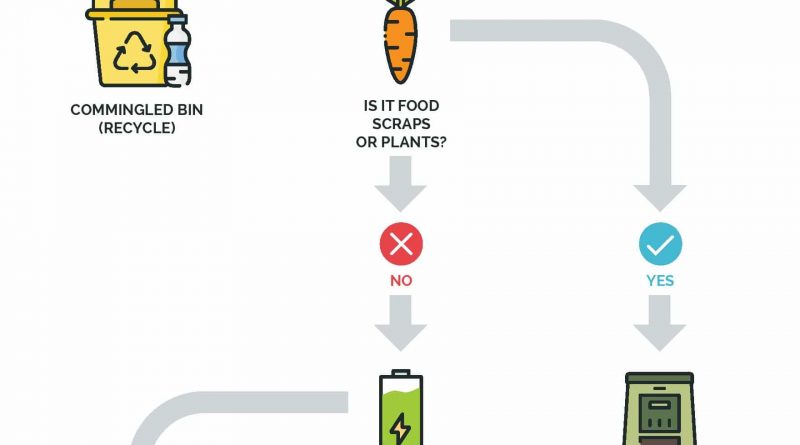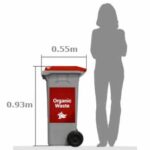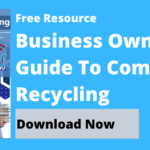Office Recycling Bins 🏢 – Are You Ready To Be A Green Office? (Infographic)
Energy Disrupter
Office Recycling Bins 🏢: during the working week, many of us spend our time in a commercial office – whether we like it or not. Environmental awareness, as well as focus on reducing pollution and waste going to landfill, is a very noble aim. Hence, optimising office recycling bins is a really good idea not just for you, but also for the environment. Basically, it makes everyone happy and fulfilled!
>Download Now: Free PDF Business Owners Guide To Commingled Recycling Bin Services
The good news is that reducing your waste going to landfill will also benefit your corporate bottom line by boosting profits! For once, we have a win-win scenario. Your accountants may even advocate for your recycling efforts.
In the infographic below, you will see that smart usage of office recycling bins can easily reduce your general waste (i.e., waste going to landfill) to pretty much zero. That certainly is a good news story.


Please copy the code below to share this infographic on your website, including attribution.
<a href="https://waster.com.au/office-recycling-bins"><img style="width:100%;" src="https://waster.com.au/wp-content/uploads/2018/09/Waster-Office-recycling-flowchart.jpg"></a><br>Infographic Provided By <a href="https://waster.com.au">Waster</a>
The recycling effort is something we all need to contribute to in the office, at home and elsewhere. There are some amazing facts about recycling in Australia that highlight what we are doing as a nation.
Office waste and recycling bins: the basics
Offices tend to produce reasonably light and clean waste streams, in comparison to, say, a cafe or a factory producing food. For this reason, their surprisingly light bins tend to contain significant amounts of recyclable materials.
In the waste and recycling industry language, they produce dry general waste. This means that the waste does not rot or smell bad, generally.
The bin sizes required by offices also tend to be quite small. Sizes such as 240-litre or 660-litre wheelie bins tend to be sufficient to meet your recycling needs. Waster focuses on providing competitive pricing for these waste streams, you can see images and descriptions of these bins on our waste shop pages here.
Generally, an office business will have small internal bins and can separate waste internally before having your cleaners bring the waste downstairs. Afterwards, it is deposited into larger waste bins for truck collection.
We provide waste and recycling wheelie bins services for offices on schedules to suit your needs such as monthly, fortnightly and weekly, etc. We understand that offices often do not need their bins collected as frequently as other businesses.
Also, we provide pricing reflecting the lightweights of your bins. When booking a general waste bin service for your office, you should select the cheapest category (i.e. transport, warehousing, retail (non-food), offices, professional services). We, thus, provide pricing that reflects your waste contents and helps you keep prices low.
Office recycling bins: are you ready to be a green office infographic transcription?
Did you know that in an Australian office, by using simple office recycling bins and recycling services, it is very possible to divert well over 90 per cent of your total waste from landfill? Correct, it can help recycle almost all your waste!
[embedded content]
In the recycling flowchart above, we will cover a simple method for you to know what to do with each item. Hopefully, we can give you some office recycling ideas that you can put into action immediately.
As most waste in an office is paper related, the first question is whether the paper is confidential in nature. If it is, it should go in your office confidential paper bin for shredding. And, if it is not, then move along the flowchart.
If it is normal paper or cardboard, you can put it in the paper or cardboard bin. This is an easy and cost-effective bin service available for office recycling throughout Australia. It is suggested all office employees have a small box or container under their desk for waste paper that can then be emptied into the cardboard and paper bin on each floor for later recycling.
The office cleaners will commonly bring the bins and waste down to the ground floor for collection and, of course, recycling.
The next question is whether the waste is bottles, cans, drinks and containers. If so, then commingled (mixed) recycling is a good bin service for nearly all office.
[embedded content]
Continuation of office recycling flowchart
If the office waste is organic (e.g., food scraps or flower clippings), you can utilise an organic waste bin or composting (quite different from recycling, but still an effective way to eliminate waste) on-site if you have space. Some companies even utilise a small worm farm!
Batteries for computer mouses, tv controllers and all other electronic items can be collected and recycled in a battery bucket. In addition, printer ink cartridges can be recycled through PlanetArk.
In the modern era, pretty much everything else you may have in an office such as coffee pods, binders and folders, snack wrappers can be recycled using Terracycle Zero Waste Boxes.
Once you have followed the flowchart above, you will have very little waste left, if any. You can place the remaining waste in a general waste bin. Or, if the amount is too small to even consider for at least a small office, then you could simply take the waste home and place them in your domestic rubbish.
In most Aussie cities, dry waste (i.e., not containing organic matter such as food waste) can be processed and turned into an alternative fuel, hence reducing the need for new carbon fuels such as oil, gas or coal.
In some cases, you could have 100 per cent of your office waste diverted from landfill.
Benefits of implementing office recycling bins and services
Focusing on a green office is becoming increasingly popular. This is also the case for looking after health and well-being through exercise and gym memberships.
We now find an increasing focus on the sustainable credentials of buildings through organisations such as the Green Building Council and State Governments efforts like here. And rightfully so, this can also be applied to commercial waste management.
Easy steps for improving outcomes with office recycling bins
New South Wales has published a useful factsheet helping commercial offices reduce their waste spend and boosting recycling.
“Sort through a typical waste bin in a commercial office and you will find it contains 76 per cent paper and cardboard, 12 per cent food waste and 6 per cent glass and plastic.
“This means almost all the contents can be recycled instead of going to waste in landfill. By putting materials like cardboard, paper and glass in the correct recycling bins your business could save money via a reduced waste collection charge plus you will be helping our environment.
The estimated average waste composition for an office is given as:
- Paper and cardboard – 76 per cent
- Food waste organics such as flowers, etc. – 12 per cent
- Glass – 2 per cent
- Plastic – 4 per cent
- Others – 6 per cent
This means that an office can reasonably easily divert almost 95 per cent of waste from landfill. See an article produced by Rombourne on the importance of having an eco-friendly office.
How exactly can you boost your recycling?
By putting in place a simple but effective waste management plan, you can pretty easily achieve very high recycling rates for your business. This can help keep your staff engaged, which can lead to a better work atmosphere.
An office is one of the easiest business types to really boost recycling. Most waste streams can be recycled, and the waste is usually dry, so in some instances, even general waste can go to a recycling plant.
We list from top to bottom the easiest and cheapest recycling options to put in place to reduce any waste ending up in landfill.
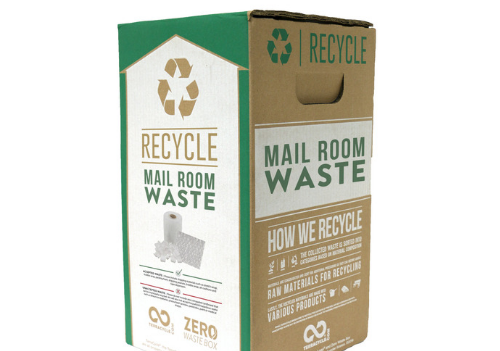

Cardboard and paper recycling
Most offices produce lots of paper and some cardboard. The long-promised paperless office is still a very long way off, despite all the new computers, tablets, phones and iPads we use (heavy e-waste producers).
The cheapest and most environmentally friendly way to get rid of it is to have a cardboard bin collection. If some of your paperwork is confidential, you can organise a shredding bin.
Confidential document shredding
A confidential shredding bin ensures your private docs are not simply thrown in the garbage.
The bin is kept and collected by security cleared driver from inside your office space. You can put all your private info and personal documents in this bin and have complete confidence that there will be no data breaches. The contents will then be taken for destruction at a secure facility off-site.
Commingled recycling: if your office has items like drinks cans, plastic bottle etc – a commingled recycling bin ( a yellow mixed recycling bin) could be a good move and will let you reduce any general waste going to landfill.
This will pretty much cover off all your lunch room containers – and is a very effective recycling method available pretty much everywhere.
Organic food waste
If you produce reasonable amounts of food waste, you might want to look for an organic food waste collection service in your area. Alternatively, if you have a garden, you could think about a small composter system. You can also use this for your coffee grounds.
TerraCycle zero-waste recycling boxes
You can recycle pretty much anything using TerraCycle recycling boxes. This include items such as cigarettes, coffee pods, rubber gloves or hairnets – pretty much anything.
We always recommend Terracycle recycling boxes to office-based businesses who really want to take recycling and office rubbish removal to the highest level and hit zero waste to landfill.
Terracycle is constantly issuing new recycling options. So, we encourage you to check back on Waster on a regular basis.
Who Waster is and how it can help you implement recycling services and reduce waste going to landfill
Waster provides comprehensive office waste and recycling services to ensure you can organise all your services through one provider. Waster is focused on helping small and medium Australian businesses (such as offices) by delivering low costs and excellent customer service. All our services such as office recycling bins are delivered on flexible 30-day agreements with no lock-in contracts and our simple pricing model contains no hidden extras.
We offer all services you would need such as confidential paper disposal, sanitary bins – as well as organic waste solutions, cardboard recycling and commingled recycling. Check out our blog on developments in Australian garbage truck technology.
There are now really nicely designed office recycling bins on the market for even the most discerning business owner. Note that these bins are for location in your office and have a high visual appeal. These bins will be emptied into larger bins downstairs for collection.
For more recycling details, see our online quiz on what can go in the recycling bin.
How to book your waste and recycling office bins in Australia online today
You can check out our terms and conditions here for office recycling bins or compare prices and book your required services through our online waste shop below:
If you have any queries, you can call our helpful customer service team on 1300 WASTER (1300 927 837). They will answer pretty much any queries you may have.
Also, check out a comprehensive listing of our pricing inclusions here and our terms and conditions here. We keep everything nice and simple so you only pay for what you signed up for with no hidden costs.
Office recycling bins: 9 tips to make office recycling more fun
Offices can be nice to work in, but they can also be sort of dull at the same time. Waster finds that when you are trying to really boost your recycling rates for offices, adding some aspect of fun or friendly competition can really help you achieve your objectives. If you do it right, you can also ensure your staff’s engagement strengthened in the process.
In this part of the blog, we will cover 9 great tips to help boost your recycling and engage your office teams. Hopefully, this can encourage you to recycle more in your office, immensely helping with our office recycling bins.
When you want good tips, you may as well go to the experts. Today, we are quoting Harvard University!
In a very good article, Harvard suggests the following 9 tips to run a successful office recycling programme:
1. Use a building waste audit to establish a baseline
Start from a common base, so people can track their improvement.
2. Use individual office audits as an educational tool
Engage with the staff by explaining what is in the bins – and where it could potentially go instead.
3. Use letter grades to drive improvement
Give people a clear path to improvement and show gradual developments.
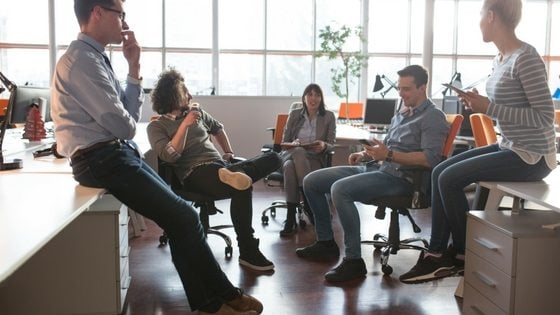

4. Encourage competition
Nothing motivates people like keeping up with or beating their neighbours. How can your offices be divided up into sensible units (i.e., floors or departments)?
5. Creativity drives success
Encourage staff to take ownership and get involved. Ideas could be brightly coloured bins or posters.
6. Create a forum asking for questions
Questions like, “can I recycle coffee cups?” are not easy to answer. Create a forum (maybe online) to provide answers and fuel engagement.
7. Regularly post progress
Consider a league table or weekly 5-minute meetup.
8. Recyclable of the week
Once you have covered the easy stuff, how about tackling the more tricky items?
9. Celebrate success and have fun
Use the process as a way to team build and have fun.
Note that once you have made some real progress with recycling, you can look at our recycling boxes for hard to recycle products like media storage and office waste.
You can see more tips for sustainable offices at the Morgan Lovell website here.
Better yet, check out our blog on Officeworks recycling – an Australian-based chain of stores selling office supplies that also take in recyclables.


